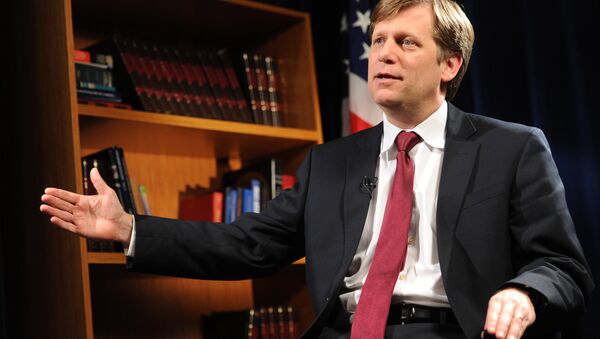The United States will accept no limits on its missile defense plans but will work with Russia in the coming years to assuage Moscow’s concerns over the project, the U.S. envoy to Russia said.
“We are going to accept no limitations on that whatsoever because the security of our people, of our allies, is the number-one top priority,” U.S. Ambassador Michael McFaul told RIA Novosti in an interview Monday.
McFaul downplayed an assurance from U.S. President Barack Obama to his Russian counterpart, Dmitry Medvedev, that Washington would be more “flexible” on the missile defense issue after U.S. presidential elections next November.
Asked about the meaning of that assurance, overheard by reporters in what Obama apparently thought were private remarks to Medvedev as the two leaders met last month in South Korea, McFaul said: “It means we are going to build whatever missile defense system we need.”
He reiterated however the U.S. argument that its missile defense plans will not, and are not intended to alter the strategic balance between Russia and the United States in any way and said work with Russia “will be one of the most important issues for the second term of the Obama administration.”
“The president believes that this is an issue where we can turn from confrontation to cooperation because we have no interest in building a missile defense system against Russia’s nuclear arsenal,” McFaul added.
The U.S.-led NATO alliance and Russia agreed in 2010 to cooperate on building missile defenses in Europe. Russia has however demanded legally-binding, written guarantees that the project would not undermine Russian security, something Washington has declined to provide.
Obama’s predecessor, George W. Bush, unilaterally terminated U.S. adherence to the 1972 Anti-Ballistic Missile (ABM) Treaty it signed with the former Soviet Union, a landmark pact of the Cold War that tightly regulated missile defense development by both Washington and Moscow.
Washington has since insisted that Moscow accept verbal assurances that future U.S. missile defense plans are not directed against Russia’s strategic missile capability but only against missile threats from “rogue states.” Iran and North Korea are often mentioned in that context.
Focus on Trade to Pursue ‘Reset’
McFaul, credited with spearheading the diplomatic “reset” that helped ease strained U.S.-Russian relations in recent years, said the two countries needed to focus on building business and trade cooperation in order to keep their slowly-improving ties on track.
“For our two countries to have more stable and normal relations, we need to have more trade, more investment, more connectivity – not just between arms controllers, but between people doing business,” the U.S. ambassador said.
In addition to supporting Russia’s accession to the World Trade Organization, the United States was taking steps, including easing some travel visa regulations, aimed at helping spur trade and investment between the two countries.
“Facilitating more economic cooperation is one of my highest priorities,” said McFaul. The U.S. envoy has regularly called on Congress to repeal the Cold War-era Jackson-Vanik amendment which penalizes U.S. companies that sell certain products to Russia.
The amendment links bilateral trades with human rights and some U.S. lawmakers have called for it to be replaced with a new law making similar linkage – something for which the Obama administration has shown little enthusiasm.
‘Security Relationship’ with Georgia
McFaul said the Obama administration has worked hard to ease tensions in the Caucasus region of the former Soviet Union, where Russia and Georgia fought a brief war in 2008, but added that Washington would not sacrifice its relations with either for the benefit of the other.
“We have a security relationship with Georgia, we have for years, and we’ll continue to have that,” McFaul said. “But we don’t think it has to come at the expense of our relationship with Russia.”
The envoy said he was not aware of any specific statement by the U.S. ambassador to Tbilisi announcing a resumption of arms supplies to Georgia – a story reported widely in Russian media, drawing a sharp rebuke from the Russian Foreign Ministry last week.
However, McFaul said that helping ensure stability in the Caucasus region and reducing international tensions there was among the top priorities for the Obama administration.
Regrets ‘Wild’ Russia Remark
McFaul, who became the subject of intense and critical coverage in Russian media shortly after he took up his post in January over a meeting with political figures including hardline anti-Kremlin activists, voiced regret over a recent remark describing Russia as a “wild” country.
“I most certainly regret that I did not speak properly,” McFaul said, referring to the remark he made in apparent exasperation as he was confronted by a group of journalists from the Kremlin-friendly NTV television network.
He attributed his comment to “rusty” Russian language skills. He again however voiced dismay that the meeting with opposition figures had generated such a negative reaction in Russia, saying that his Russian counterpart in Washington met Republican Party leaders despite Obama being of the Democratic Party.
“This is normal diplomacy… to meet with opposition leaders,” McFaul said. “Why it’s such a big deal here – that’s a mystery to me.”


